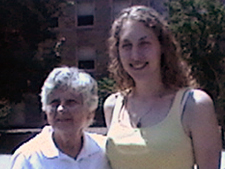Lincoln Hall Project

Katherine Amato (graduate student, Program in Ecology, Evolution, and Conservation Biology) discusses the nitty-gritty of research in Mexico with friend and financial supporter Roslyn Snow (AB ’58, philosophy; AM ’59, English).
Katherine Amato: I think they actually used the sound from these monkeys, mixed in with other sounds, to make dinosaur sounds in Jurassic Park, the movie. So you really get that feeling that you’re somewhere different when you hear the monkeys.
Roslyn Snow: That you’ve gone back some millennia.
Katherine Amato: Yeah, yeah. When I was first looking at working in Mexico, I took a friend with me from high school that doesn’t do any sort of science work. I had heard howler monkeys before, so I was used to it and didn’t think to warn her. As we were walking up the stairs to the place we were going to stay for a couple of nights, the howler monkeys started howling. She stopped dead in her tracks and said: What is that!” I was like: “Oh, those are the monkeys. Those are what we came to find.” So it’s a very different sound that I take for granted now. It is very different. We had some animal encounters in our cabana as well. One night I woke up with army ants in my bed.
Roslyn Snow: Was that painful?
Katherine Amato: It was. Army ants eat other insects. So what happens when army ants come through—they migrate from place to place. They don’t have one nest, so they just kind of sweep through a place. As long as you get out of the way, it’s kind of nice, because they clean everything up. Every other insect that was around either runs away or gets gobbled up. So if you kind of just stand out of the way, they’ll sweep through and leave you alone. They’ll be gone in 20 minutes. But apparently this group—this hoard—of army ants came through in the middle of the night and decided, some of them, to come into our cabana. And we were asleep. I think it was one or two in the morning. I think what happened was they were crawling on the wall right above my bed, right above where my pillow was touching the wall. And I must have moved enough to disrupt their track, and then they started going into bed. So I woke to them in my bed. They’re not aggressive, but if you’re in their way, they’ll start to bite. So that’s what I woke up to.
Roslyn Snow: I wanted to do a little experiment of my own. So I discovered that there were some monkeys at a local zoo near my house. So I went to watch them for a day. And I was telling Katie in the email that my mind was wandering, my focus, my concentration. When I read what her day is like, watching so intently with such focus, locating not only the monkeys but the droppings—samples. I had really renewed respect for the whole business of field research. It’s just incredible. And that’s why I was so glad to meet you.

(Length: 2:48)